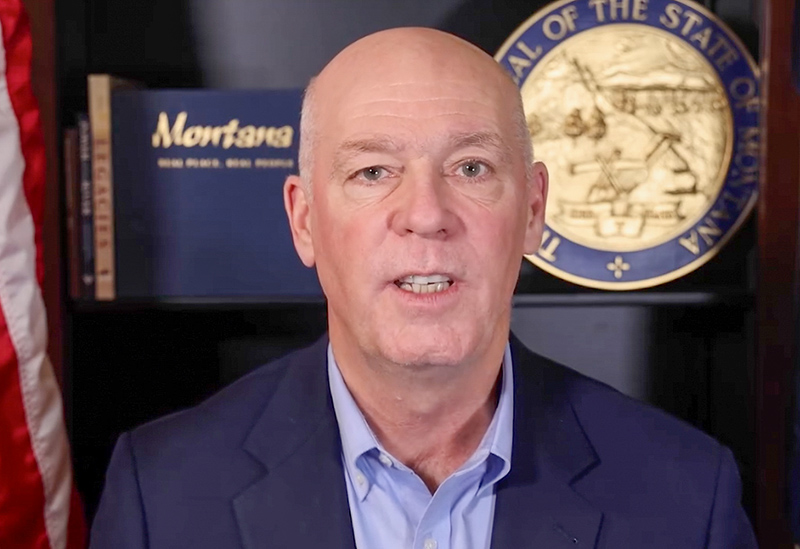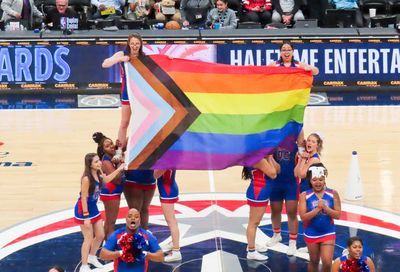United States Earns a “C” on LGBTQ Human Rights Scorecard
United States ranks below Western European and South American countries on analysis of LGBTQ protections across the globe.
By John Riley on September 26, 2023 @JRileyMW

A new report on the state of LGBTQ human rights ranks the United States fairly high in comparison to other countries but only results in a middling overall grade for the country as a whole.
The Franklin & Marshall Global Barometers Report gave the United States a “C,” or “resisting” grade, when it comes to protecting or promoting LGBTQ rights, while nearly two-thirds — 62% — of the 136 countries covered in the report received “F” grades for “persecuting” LGBTQ rights.
Despite ranking 31st out of 136 countries, the United States earned 74% on the barometer of gay rights, falling significantly behind other countries such as Austria, Denmark, Finland, Luxembourg, Malta, Sweden, and Uruguay, all of which tied for first on the list with perfect scores of 100%.
It also ranks behind several other Western European or South American countries, including Ireland, Great Britain, Belgium, Bolivia, Brazil, and Argentina, which either won “A” or “B” grades for “protecting” or being “tolerant” of LGBTQ rights, respectively.
When it comes to transgender rights, Luxembourg, Malta, and Norway earned perfect scores, with Austria, Belgium, Denmark, Estonia, Iceland, North Macedonia, and Uruguay earning “A” scores.
Meanwhile, the United States only garnered 59% on the barometer of transgender rights, tying for 62nd out of 163 countries.
The data only covers 2011 to 2020. It was based on a survey of 167,000 queer people polled worldwide, looking at the “lived realities” of those respondents.
Information taken into account for the analysis of that survey includes the existence or lack of legal protections, the level of advocacy for LGBTQ rights in the country, the socioeconomic rights enjoyed by LGBTQ people, and whether LGBTQ people are societally persecuted.
Because the data only goes through 2020 — before the recent spate of anti-transgender legislation in various states, with more than 700 bills introduced this year alone — the United States may be headed toward a failing grade in future iterations of the study.
“You’ll probably see a lot lower grades because if one state violates one of the items that we’re looking at, the whole country gets to zero, so there’ll be a downgrade for the United States,” Susan Dicklitch-Nelson — a professor of government at Franklin & Marshall College in Lancaster, Pennsylvania, and the study’s founder — told The 19th.
Dicklitch-Nelson said Florida alone could lower the whole country’s human rights score due to the passage of various anti-transgender legislation and the so-called “Don’t Say Gay” bill banning classroom discussions of LGBTQ identity.
But she also noted that recent attempts to ban or restrict drag may be indicative of the fact that LGBTQ groups may no longer be able to gather safely in the country.
“With the anti-drag laws that they have in Tennessee and in Florida, a lot of LGBT rights organizations are not able to peacefully or safely assemble, or pride events are not allowed by the state,” she said. “And do security forces provide protection [for] LGBT Pride participants? Again, that varies…depending on state.”
According to The 19th, breakout data from the global survey indicates that, based on surveys of 13,809 LGBTQ people in the United States, that individual states are generally considered “resistant” to LGBTQ human rights. No individual state scored above a “C” grade, with nearly all getting “D” ratings — despite the presence of nondiscrimination laws on the books.
The best state for LGBTQ residents, based on the ranking criteria, was Hawaii, followed closely by Maine and Massachusetts, while Idaho had the lowest score of all 50 states.
One of the factors influencing the overall score of the United States — even on gay rights — may be the lack of federal nondiscrimination protections, which have stalled in Congress since 1974.
For example, the Equality Act, a comprehensive bill prohibiting discrimination against LGBTQ people in various facets of life, has twice passed the U.S. House of Representatives — though only when Democrats controlled the chamber — only to be waylaid in the U.S. Senate.
By comparison, North Macedonia’s score on the Global Barometers Report jumped by 53%, from a failing grade to an “A” in 2020, after the country’s national legislature passed nondiscrimination protections in 2019.
The report also noted that there appears to be a correlation between countries that ranked the highest on their protections for LGBTQ rights and those that scored well in protecting democracy and promoting economic growth.
Dr. Anu Kumar, the president and CEO of Ipas, an international nonprofit advocating for reproductive rights, told The 19th that separate research by her organization shows that democracy is tied to human rights more broadly.
“We can’t really talk about these issues in silos,” Kumar said. “The anti-abortion, anti-LGBTQI movements are all part of the same broader attack on democracy. These things are connected.”
3 Million People Could Die Due to HIV Funding Cuts
A new study claims that almost 11 million more HIV infections, and 3 million deaths, could result from the loss of global HIV funding.
By John Riley on March 31, 2025 @JRileyMW
A new study claims that nearly 11 million more people could become infected with HIV, and 3 million could die by the end of the decade, due to foreign aid cuts impacting funding for HIV prevention and treatment.
Published in The Lancet HIV, the study estimates the potential public health impact of proposed foreign aid cuts by the five donor countries that account for 90% of all international HIV funding.
Those countries are the United States, the United Kingdom, France, Germany, and the Netherlands.
The greatest impact of the cuts would be felt in sub-Saharan Africa and among vulnerable or marginalized populations at higher risk of HIV, including children, injection-drug users, sex workers, and men who have sex with men, reports Politico.
Cynthia Erivo to Headline WorldPride Concert on June 7
Organizers announced that award-winning actress and singer Cynthia Erivo will headline WorldPride's Street Festival and Concert on June 7.
By John Riley on March 5, 2025 @JRileyMW
Grammy, Emmy, and Tony Award winner Cynthia Erivo has been announced as a headliner of the WorldPride 2025 Street Festival and Concert.
Erivo, a three-time Oscar nominee who portrayed Elphaba in 2024's blockbuster movie Wicked, and who will reprise the role later this year in Wicked Part 2, frequently uses her platform to uplift diverse voices, champion inclusivity, and promote equity and greater LGBTQ representation and visibility.
Last fall, she was honored at the Human Rights Campaign National Dinner, where she was presented with the organization's National Equality Award.
Montana Governor Signs Anti-Trans Bills into Law
Montana Gov. Greg Gianforte has signed two bills banning transgender people from bathrooms matching their gender and from women's sports.
By John Riley on March 30, 2025 @JRileyMW
Montana Gov. Greg Gianforte signed two anti-transgender bills into law, one of which bars transgender people from public restrooms matching their gender identity and the other banning transgender women and girls from female-designated sports teams.
The laws were passed on party-line votes in both legislative chambers, with Republicans voting in the affirmative.
The first law requires public schools, correctional facilities, other public buildings -- including the state Capitol -- and domestic violence shelters to designate bathrooms, changing facilities, and sleeping areas for a single sex -- male or female. Entry to such spaces will be based on a person's assigned sex at birth, as determined by a person's chromosomal makeup.
Support Metro Weekly’s Journalism
These are challenging times for news organizations. And yet it’s crucial we stay active and provide vital resources and information to both our local readers and the world. So won’t you please take a moment and consider supporting Metro Weekly with a membership? For as little as $5 a month, you can help ensure Metro Weekly magazine and MetroWeekly.com remain free, viable resources as we provide the best, most diverse, culturally-resonant LGBTQ coverage in both the D.C. region and around the world. Memberships come with exclusive perks and discounts, your own personal digital delivery of each week’s magazine (and an archive), access to our Member's Lounge when it launches this fall, and exclusive members-only items like Metro Weekly Membership Mugs and Tote Bags! Check out all our membership levels here and please join us today!
The Magazine
-
Most Popular
 Gay Army Reserve Officer in Uniform Sex Video Scandal
Gay Army Reserve Officer in Uniform Sex Video Scandal  A Potent (and Pricey) 'Good Night, And Good Luck'
A Potent (and Pricey) 'Good Night, And Good Luck'  Sarah Snook is Astonishing in Broadway's 'Dorian Gray'
Sarah Snook is Astonishing in Broadway's 'Dorian Gray'  Charges Dropped in Nancy Mace Assault Case
Charges Dropped in Nancy Mace Assault Case  'Gray Pride' Protests Hungary's Ban on Gay Pride Marches
'Gray Pride' Protests Hungary's Ban on Gay Pride Marches  Hugh Bonneville Delivers a Show-Stopping Vanya
Hugh Bonneville Delivers a Show-Stopping Vanya  Gay Porn Star Tim Kruger Dead at 44
Gay Porn Star Tim Kruger Dead at 44  Jared Polis Signs Law Repealing Colorado's Gay Marriage Ban
Jared Polis Signs Law Repealing Colorado's Gay Marriage Ban  Awesome Con Gallery: Rage Gear Studios
Awesome Con Gallery: Rage Gear Studios  Gays in 'Greatest Danger I Have Ever Seen' says Russell T Davies
Gays in 'Greatest Danger I Have Ever Seen' says Russell T Davies
 A Potent (and Pricey) 'Good Night, And Good Luck'
A Potent (and Pricey) 'Good Night, And Good Luck'  Sarah Snook is Astonishing in Broadway's 'Dorian Gray'
Sarah Snook is Astonishing in Broadway's 'Dorian Gray'  'Gray Pride' Protests Hungary's Ban on Gay Pride Marches
'Gray Pride' Protests Hungary's Ban on Gay Pride Marches  Jared Polis Signs Law Repealing Colorado's Gay Marriage Ban
Jared Polis Signs Law Repealing Colorado's Gay Marriage Ban  White House Ignores Reporters with Pronouns in Email Signatures
White House Ignores Reporters with Pronouns in Email Signatures  White House Demands NIH Study Transgender Transition "Regret"
White House Demands NIH Study Transgender Transition "Regret"  Air Force Reverses Ban on Pronouns in Email Signatures
Air Force Reverses Ban on Pronouns in Email Signatures  Transgender Blackhawk Pilot Sues Right-Wing Influencer
Transgender Blackhawk Pilot Sues Right-Wing Influencer  'cullud wattah' is a Compelling Drama About Flint's Toxic Water
'cullud wattah' is a Compelling Drama About Flint's Toxic Water  Gay French Thriller 'Misericordia' is Creepy and Suspenseful
Gay French Thriller 'Misericordia' is Creepy and Suspenseful
Scene
Metro Weekly
Washington's LGBTQ Magazine
P.O. Box 11559
Washington, DC 20008 (202) 638-6830
About Us pageFollow Us:
· Facebook
· Twitter
· Flipboard
· YouTube
· Instagram
· RSS News | RSS SceneArchives
Copyright ©2024 Jansi LLC.












You must be logged in to post a comment.